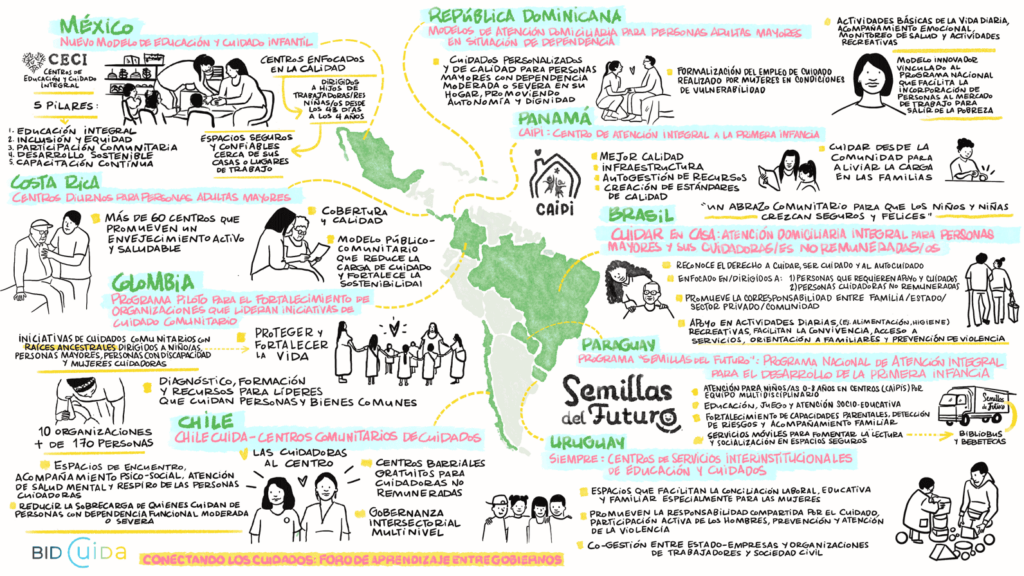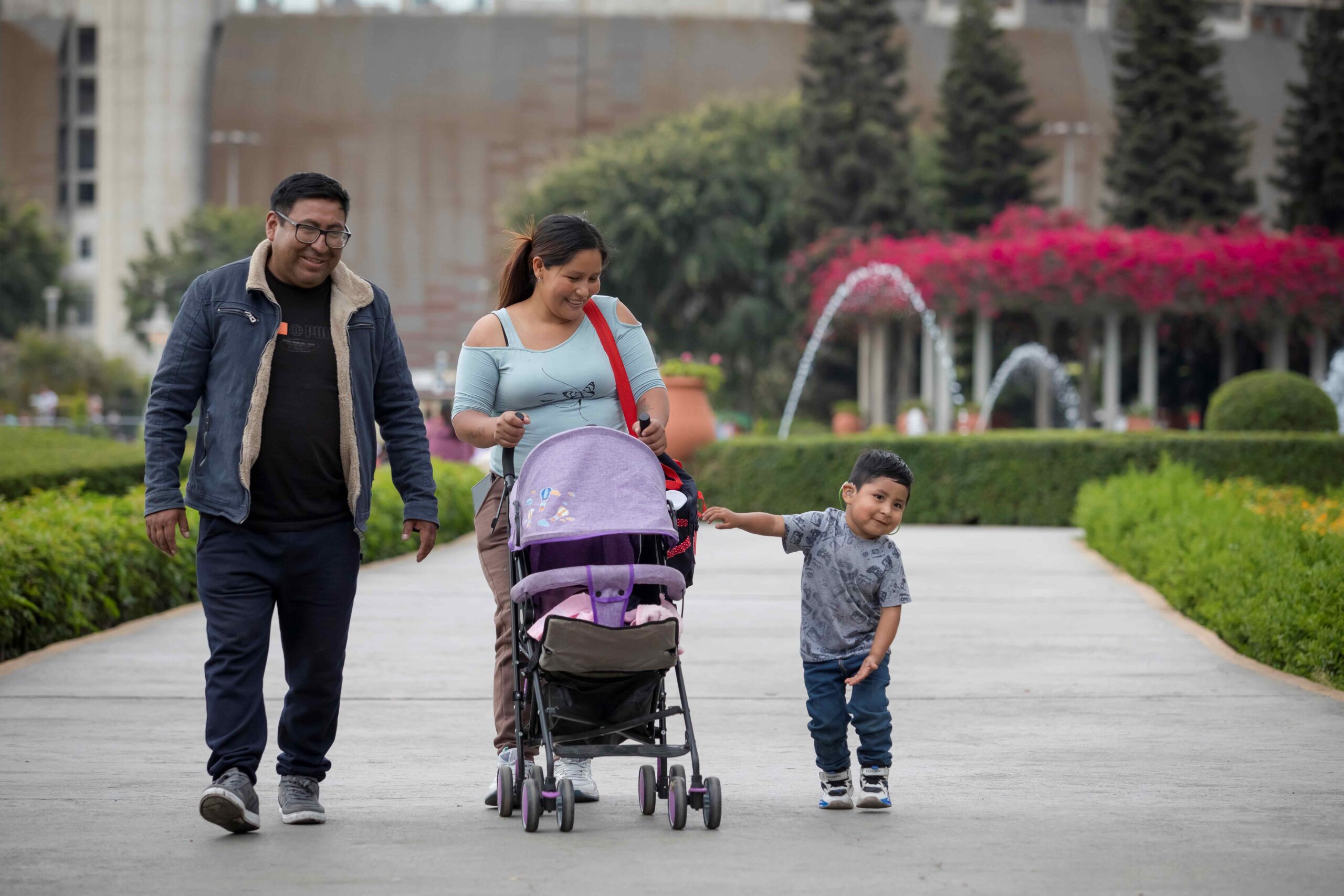Reflections from the first IDB regional forum IDB Cares: Connecting Care: Learning between governments

The importance of care policies in public and private consciousness in Latin America and the Caribbean continues to grow. It is estimated that nearly 31 million jobs could be created in the region by 2035, mostly held by women, if childcare and long-term care services are strengthened to meet growing demand. Given their importance for economic growth and the development of more equitable and inclusive societies, more and more countries are leading innovative models of care service delivery.
Ten years ago, Uruguay created its integrated national care system. Today, a dozen countries in the region are building comprehensive care systems—from regulatory frameworks, coordination mechanisms between different levels of government and between the state, businesses, and community organizations, mechanisms for professionalizing care work, to systems for measuring service quality. Recently, the Inter-American Court of Human Rights recognized care as an autonomous human right.
Despite these advances, much remains to be done to expand the coverage of quality services and thus respond to the growing demand for care for children, older adults, people with disabilities who need support, and their caregivers. The recent regional forum of the IDB Cares initiative, held in Mexico City, brought together authorities from nine countries in the region with whom the IDB is working to learn about innovative models of care services that governments have identified as promising for scaling up.
Common challenges were identified, including sustainable financing, governance, institutional capacity, professionalization of care, and cultural changes necessary so that care is not perceived as a natural and exclusive responsibility of women, among others. There was a clear call for the IDB to be a strategic partner in helping countries address these challenges with concrete solutions. This blog summarizes the main reflections and lessons learned from the event, focusing on three key areas.
1. There are Promising Models and Concrete Lessons Learned
Governments, international organizations, and the IDB examined nine innovative care service practices, highlighting what worked, what was learned, and what could be improved based on concrete experience. The diversity of models is wide, and a systematization of the distinctive components to consider when taking to scale will be available in the coming months. Below is an overview of the innovations that are transforming care in the region:
- Community care programs (Chile, Colombia): Spaces that combine services for caregivers and for people who need care, with a territorial focus, community participation, and intersectoral coordination in areas far from urban centers. In these spaces, community organizations, municipal and national governments discuss, design, and build flexible models and contextualized solutions that integrate different modalities of social and health service delivery at home, in centers, and through telecare.
- Home care (Brazil, Dominican Republic): Models that promote the preference of older people to age in their homes, with an emphasis on training caregivers. In the Dominican Republic, this model seeks to formalize employment in the care sector, especially for women who work in precarious conditions, by offering continuous training and certification. In Brazil, a program is being developed that integrates health and social assistance services.
- Early childhood care centers in workplaces (Uruguay): A pioneering experience of shared social responsibility between companies, workers’ organizations (unions), and the state, which provides services for early childhood. In addition, this care service is complemented by capacity-building programs for parents, caregivers, and staff working in centers to promote a more equitable distribution of care work between men and women, as well as shared responsibility.
- Information systems for managing day care for older persons (Costa Rica): Spaces that promote active and healthy aging, prevent health complications and hospitalizations through multidisciplinary and social-health care involving the State, the community and families. This model uses a standardized assessment tool to measure a person’s degree of dependency, i.e., the extent to which they need help from others to perform basic activities of daily living, in order to allocate resources equitably and improve transparency and accountability.
- Scalable comprehensive early childhood development models (Paraguay, Panama, Mexico): Initiatives that integrate health, nutrition, early stimulation, and family support services, with strong political leadership and a long-term vision. With different trajectories, these models aim to expand their service network with a comprehensive strategy that prioritizes the expansion of infrastructure and adequate equipment, quality standards, and the strengthening of human talent and measurement of the impact of services.
2. Countries Face Common Challenges in Scaling Up Care Models
Countries highlighted similar challenges in consolidating and scaling up their systems of care:
- Sustainable financing: The need to explore innovative sources such as earmarked taxes, debt-for-care swaps, and solidarity funds was emphasized. Developing financing mechanisms for comprehensive care systems requires improving spending efficiency, transparency, and making long-term projections that prioritize investment in human resources and services based on quality relationships, mutual respect, and dignity.
- Intersectoral and multilevel governance: The governance structures of the participating countries have made it possible to incorporate care as a cross-cutting issue in ministerial cabinets. However, there was debate during the forum about what conditions these structures must meet in order to become agile mechanisms for expanding care policies.
- Institutional capacity: Many countries lack robust information systems, updated regulatory frameworks, and trained personnel to design, implement, and evaluate care policies.
- Recognition and professionalization of care work: Salary recognition, professionalization, and certification of caregivers are required to ensure the sustainability of the sector under decent working conditions and the quality of care. In a context of sociodemographic transition and technological transformation, care is emerging as an irreplaceable source of employment. Artificial intelligence and telecare can support, but never replace, the human dimension of care.
- Cultural change and shared responsibility: The expansion of services must be accompanied by strategies that promote shared responsibility for care and transform social norms that perpetuate the disproportionate burden of care work on women and girls. In addition, individuals, institutions, and families need support and policies—such as leave policies—that facilitate the practice of care.

3. The Role of the IDB: Accelerating Investments, Facilitating Strategic Alliances and Learning
“The IDB has been a key player in ensuring that Latin America, which faces this care challenge, is addressing it, but also addressing it very effectively and very quickly.”
Yorleni Leon, Minister of Human Development and Social Inclusion of Costa Rica
Building on a solid track record of two decades as a key partner in the development of care systems in the region, the launch of IDB Cares—our umbrella initiative that brings together technical advice, knowledge, and financing to promote comprehensive care systems in Latin America and the Caribbean—reaffirms the care agenda as a strategic institutional priority.
The IDB makes the following available to countries:
- Financial instruments (policy-based loans, investment loans, facilities, guarantees, among others).
- Non-reimbursable technical cooperation for policy design, implementation, and evaluation.
- Opportunities for dialogue, exchange of experiences, and peer learning.
- Evidence generation and systematization of good practices.
The care agenda in Latin America and the Caribbean is a historic opportunity to advance towards equity, social inclusion, and sustainable development. The IDB is called upon to be a strategic partner to countries in this collective transformation. As stated at the forum, “good ideas do not scale on their own,” and to translate local success into regional impact, we need to identify the essential ingredients of models that work, understand what makes them scalable, and build partnerships to sustain them over time. The upcoming publication on scalable care experiences will systematize these essential ingredients of the care models analyzed during the forum to offer concrete solutions to the common challenges of scaling them up.
If you would like to learn more about the work of IDB Cares, as well as the projects and resources we offer, please visit our website.



Leave a Reply